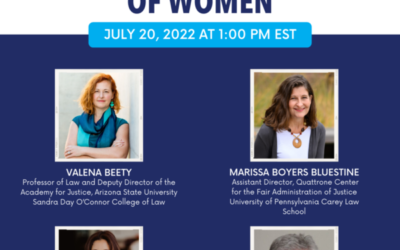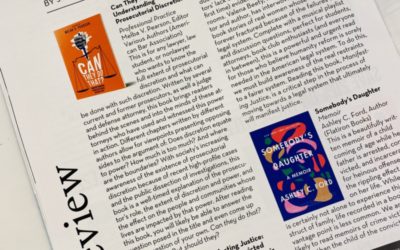Featured on USA Today – https://www.usatoday.com/victim-compensation-funds-should-include-police-violence-witnesses-column/
Discussions of police shooting tragedies often exclude a stakeholder: the traumatized eyewitness to police violence. In the recent shooting of Daunte Wright, his girlfriend witnessed his shooting and death. In the killing of George Floyd, numerous bystanders served as traumatized witnesses. As law professors who have studied crime victim compensation programs around the nation, we contend traumatized eyewitnesses and victims of unlawful police violence need to be classified as crime victims.
During the Derek Chauvin trial, the country learned that Floyd was not the officer’s only victim. The bystanders who testified of their feelings of guilt and helplessness were also harmed. Although some victims of police brutality may be successful in bringing or settling lawsuits, traumatized eyewitnesses are often seen as collateral damage. Most crime victims can apply for little-known state benefits called victim compensation funds (VCF). However, these funds frequently fail to assist indirect victims of police violence. This needs to change.
Don’t punish victims

Imagine a child who is shot and killed. Under most circumstances, victim compensation funds may help the family with critical funeral, medical and mental health costs. In the same scenario, if the killer was a police officer, like in the case of 12-year-old Tamir Rice in Cleveland, or 14-year-old Antonio Aces in Phoenix who were both killed by police while possessing toy guns, VCF funds would probably not be available, largely because their killers were police.
At its core, VCF exists to help crime victims because it is the right thing to do and it is based on simple principles of compassion and decency. Every state has adopted VCFs as they are, in the words of a Department of Justice report, “a simple humanitarian response to a compelling human need.” Yet legislators established additional requirements that block relief for many crime victims. Requirements that focus less on assisting victims and more on blaming them should be abolished.
The first requirement for VCF is a police report that identifies the victim of a crime. Police reports are written by officers, and in cases of police brutality, officers could label victims as contributing to what happened to them, in order to shield police departments from liability. Known as “contributory misconduct,” this analysis considers if the victim provoked or caused the crime to occur.
Consider the children killed at the hands of the police. Although they were innocent of any crime, police alleged that they were threatening. VCF decisionmakers would interpret this as “contributory misconduct” — a frequent basis for denying VCF.
Don’t force cooperation
The second requirement is cooperating with law enforcement. A VCF decisionmaker could conclude that the bystander victims who witnessed Floyd’s death were uncooperative because they asked the police officer to stop and recorded his actions. In cases involving police misconduct, qualification for victim compensation funds should be untethered from any requirement of cooperation with police.
The barrier created by the cooperation and contributory misconduct requirements is broad-sweeping. These requirements could also exclude sexual assault or domestic violence victims who, for instance, decide against further prosecution. They can exclude victims with a criminal history, even if the criminal history is unrelated to the person’s victimization.
Some argue that taxpayer funds should not be used to compensate people who appear to resist arrest or do not obey police orders. Notably, VCF monies do not come from taxpayer dollars. VCFs are funded by fines and fees collected from criminal defendants, almost like a form of insurance for the security of civilians. In some states, prosecutors have the authority to designate victims for consideration by the VCF board. In San Francisco, District Attorney Chesa Boudin announced last year a new initiative funding compensation for victims and witnesses of police violence.
A legislative answer
Legislative fixes could make funds accessible to victims of excessive force by police.
In 2020, the California legislature considered Assembly Bill 767 to explicitly list excessive use of force by police as a crime eligible for compensation, regardless of whether the officer had been formally arrested or charged. Applicants who failed to cooperate with the police investigation could still receive compensation, and the compensation board could consider broad forms of evidence to establish the crime, instead of requiring a mandatory police report.
‘Boots on the Ground’:An inside look at the exhausted Black community in Minneapolis after George Floyd
Although the bill passed the California State Assembly, it was unsuccessful in the State Senate. Still, the bill provides a framework for other states to adopt that makes victims of police violence eligible for victim compensation funds.
Victims of violence, including Daunte Wright’s girlfriend and the bystanders who witnessed the agonizing death of George Floyd, are traumatized. Providing them with funds to cover the costs of counseling is the least society can do. Barriers to that assistance must be removed.
Njeri Mathis Rutledge, a professor of law at South Texas College of Law Houston, is a former prosecuting attorney, a wife and a mother. She graduated from Spelman College and Harvard Law School. Follow her on Twitter: @NjeriRutledge
Valena Beety is a former prosecutor and innocence project litigator. She currently serves as a professor of law at Arizona State University Sandra Day O’Connor College of Law and is the deputy director of the Academy for Justice, a criminal justice center connecting research with policy reform. Her forthcoming book is “Manifesting Justice.” Follow her on Twitter: @valenabeety




